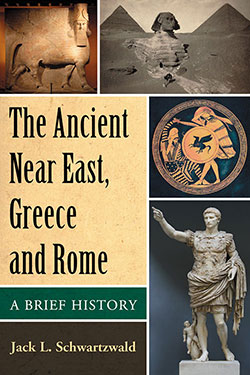The Ancient Near East, Greece and Rome
A Brief History
$39.95
In stock
About the Book
This book offers a concise survey of Western Civilization from the Stone Age through the fall of the last Western Roman Emperor in AD 476. Each of the three sections chronicle a critical epoch in human history. Section I encompasses man’s ascent from barbarism to civilization in the Ancient Near East; Section II witnesses the development of Western Civilization in Ancient Greece; and Section III catalogs the failed attempt to build the West’s first “nation-state” in Ancient Rome. Human foibles are abundantly portrayed but so too is the ascent of humankind.
About the Author(s)
Bibliographic Details
Jack L. Schwartzwald
Format: softcover (6 x 9)
Pages: 232
Bibliographic Info: notes, bibliography, index
Copyright Date: 2014
pISBN: 978-0-7864-7806-4
eISBN: 978-1-4766-1307-9
Imprint: McFarland
Table of Contents
Table of Contents
Preface 1
Part I. The Cradle of Civilization: The Ancient Near East 5
Part II. The Cradle of Western Civilization: Ancient Greece 35
Part III. The Cradle of the Nation-State: Ancient Rome 105
Notes 191
Bibliography 205
Index 213
Book Reviews & Awards
“an interesting and engaging voice that grabs the reader’s attention right from the beginning and keeps them going for the whole book…an excellent reference tool”—San Francisco Book Review; “Jack Schwartzwald has authored a well-researched, skillfully crafted, engagingly written book. It should have considerable appeal to the general reader and to those who, like Schwartzwald, have a genuine passion for history.”—Robert Weisbord, University of Rhode Island; “In most of Europe and America we have lost touch with the grand sweep of western history. Jack Schwartzwald reminds us of those ancient foundations upon which is built all that is good in the western heritage. I recommend this book for the casual reader who seeks an understanding of these foundations.” —Kenneth Calvert, Hillsdale College





